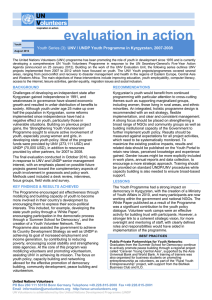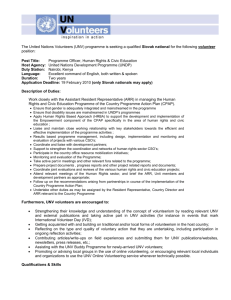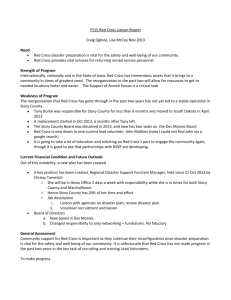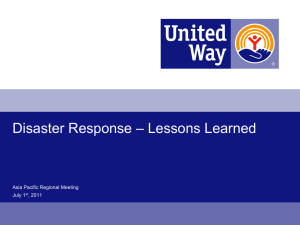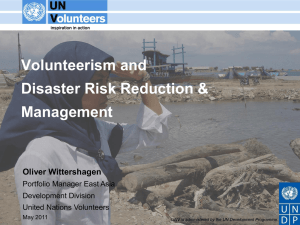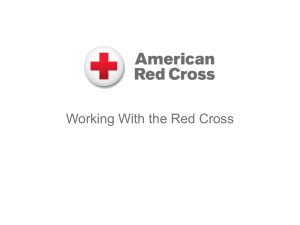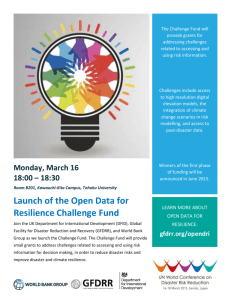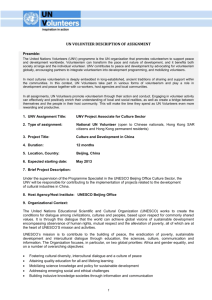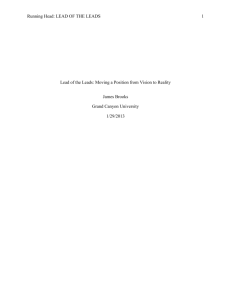United Nations Volunteers Statement to the
advertisement
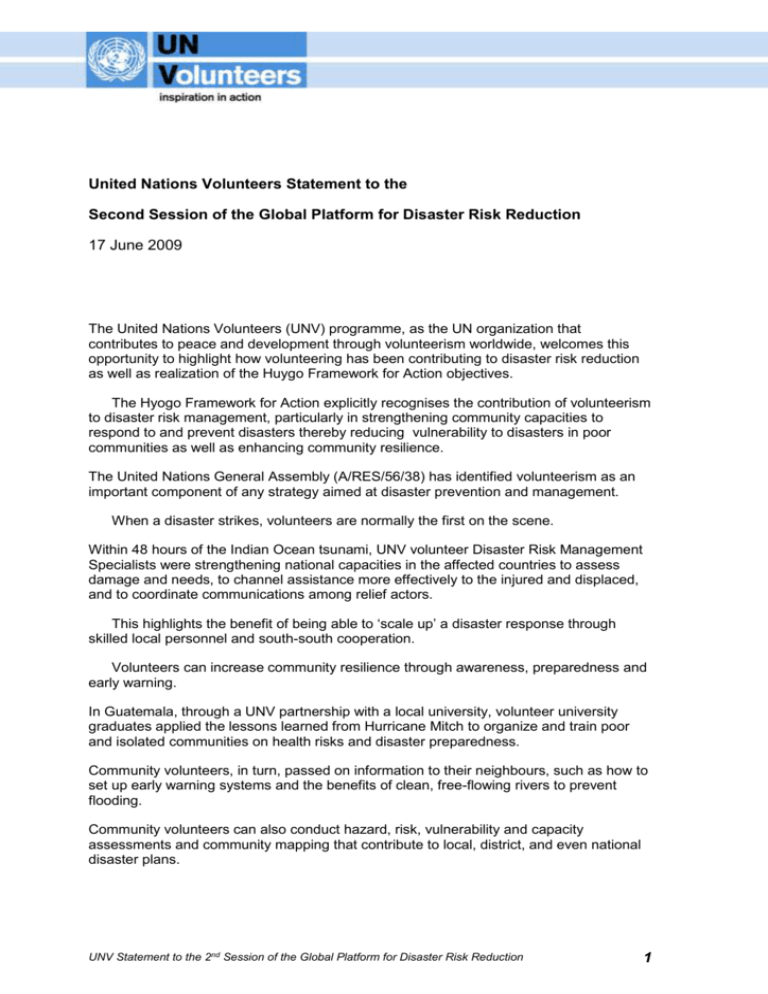
United Nations Volunteers Statement to the Second Session of the Global Platform for Disaster Risk Reduction 17 June 2009 The United Nations Volunteers (UNV) programme, as the UN organization that contributes to peace and development through volunteerism worldwide, welcomes this opportunity to highlight how volunteering has been contributing to disaster risk reduction as well as realization of the Huygo Framework for Action objectives. The Hyogo Framework for Action explicitly recognises the contribution of volunteerism to disaster risk management, particularly in strengthening community capacities to respond to and prevent disasters thereby reducing vulnerability to disasters in poor communities as well as enhancing community resilience. The United Nations General Assembly (A/RES/56/38) has identified volunteerism as an important component of any strategy aimed at disaster prevention and management. When a disaster strikes, volunteers are normally the first on the scene. Within 48 hours of the Indian Ocean tsunami, UNV volunteer Disaster Risk Management Specialists were strengthening national capacities in the affected countries to assess damage and needs, to channel assistance more effectively to the injured and displaced, and to coordinate communications among relief actors. This highlights the benefit of being able to ‘scale up’ a disaster response through skilled local personnel and south-south cooperation. Volunteers can increase community resilience through awareness, preparedness and early warning. In Guatemala, through a UNV partnership with a local university, volunteer university graduates applied the lessons learned from Hurricane Mitch to organize and train poor and isolated communities on health risks and disaster preparedness. Community volunteers, in turn, passed on information to their neighbours, such as how to set up early warning systems and the benefits of clean, free-flowing rivers to prevent flooding. Community volunteers can also conduct hazard, risk, vulnerability and capacity assessments and community mapping that contribute to local, district, and even national disaster plans. UNV Statement to the 2nd Session of the Global Platform for Disaster Risk Reduction 1 In the context of disaster recovery and reconstruction, international UNV volunteers can provide the high level technical expertise needed to restore critical services and infrastructure. In the Maldives, for example, after the tsunami UNV volunteer engineers supervised the repair of island harbours and developed national capacity to draft a National Building Code. Volunteers can support culturally appropriate, community based adaptation to climate change to build resilience to future disaster risk. In support of the Global Environmental Facility/Small Grant Programme (GEF/SGP) in Sri Lanka, national UNV volunteers helped strengthen the capacities of local NGOs and community volunteers to conduct beach rehabilitation and biodiversity enhancement, and to take responsibility for marine and coastal ecosystem management and documentation. The Progress Report to this Second Global Platform for Disaster Risk Reduction notes that “the full involvement of local communities and local governments to reduce risk remains a challenge that needs to be addressed.” Evaluations of the contribution of UNV volunteers in the tsunami response indicate the added value of volunteers in meeting this challenge. UNV volunteers worked with local governments to build capacity to make decisions and provide services, while also empowering community members to articulate claims and demand accountability and facilitating access to decision-makers. Volunteers, although associated with UN agencies, were perceived as more independent and flexible, and thus were able to receive and build on local trust. Because the volunteers were working and also living with them, communities felt respected as equitable partners in the recovery and development process. Building on local volunteering traditions, communities, themselves, were effectively ‘animated’ to address the causes of vulnerability for individuals, families, or communities. For UNV, gender is an important issue in effectively addressing the interrelationship between poverty reduction and disasters. For this reason, in the UNV tsunami response in Aceh and Northern Sumatra, 42% of the national UNV volunteers deployed were women. Approximately 70% of the ‘Extremely Vulnerable Individuals’ receiving financial and medical services support were women; and half of the post-traumatic stress counsellor trainees and 44% of those counselled were women. UNV would like to recommend that governments and organizations, in partnership with UN/ISDR, explore further the impact of volunteerism on strengthening resilience to disaster risk in poor communities and increase recognition and support for the strategic involvement of volunteers in disaster risk reduction. UNV Statement to the 2nd Session of the Global Platform for Disaster Risk Reduction 2
